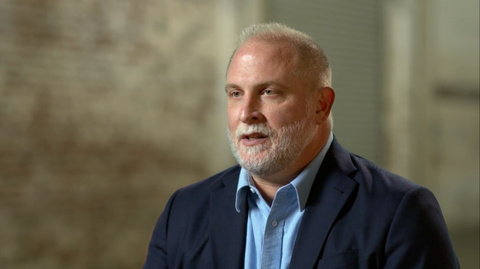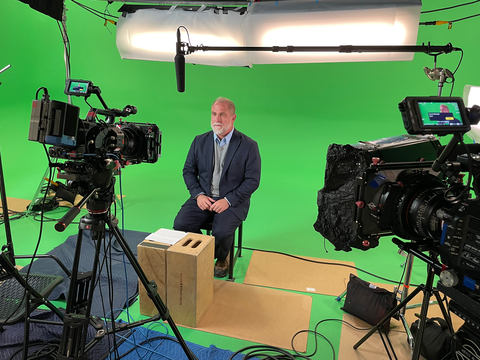By Abby Wedemeyer
Robert R. Cargill, Roger A. Hornsby Associate Professor in the Classics in the College of Liberal Arts and Sciences, is no stranger to the documentary industry.
Cargill’s expertise in religion and archeology has led to many appearances in documentaries on major networks, such as CNN and Netflix. His latest contribution, History’s Holy Marvels with Dennis Quaid, now streaming.

Holy Marvels delves into the history behind “some of the world’s most sacred holy relics,” with Cargill offering scholarly insights into their origins, the misconceptions surrounding them, and the quests undertaken to discover them.
“There’s not a lot of hard archeological evidence for Jesus, in fact, there is none,” Cargill said. “We have archeological evidence for Pontius Pilate, we have literary evidence for John the Baptist... we have all the evidence for the context of Jesus, but none of the evidence itself. This is why the debate is so much fun.”
In some of his past documentary appearances, Cargill explained he often appears within the first few segments acting as an authority figure to endorse or debunk some of the claims being made throughout the program.
“But in this show, they had me talk more about the nature of these objects... now do we know where they are? No. But we know they likely existed, and my job is to try and ground all the theories they will be asking about, to see if they are possible.”
Cargill notes that we often see a “popular appetite” for biblical discourse within the United States, which is reflected in Holy Marvels and many of his other television appearances.
This popular interest extends to academia, with many university students enrolling in related courses, Cargill explained.
“I want students to learn the proper material, and I don’t want them learning speculation or falsehoods. I want them to learn the actual facts,” Cargill said.
His documentary appearances are what help students gain interest in his classes where they can learn scholarly material about biblical topics, Cargill added.
In 2020, Cargill began working with CLAS administration to offer courses related to his documentary subjects to see if they translated into student enrollments.
“I took one of the books I had written, The Cities That Built the Bible, and I converted that into a course,” Cargill said. “It immediately filled up to about 200 students.”

Cargill’s courses include CLSA:4452 Dead Sea Scrolls, CLSA:4901 Biblical Hebrew I, CLSA:2489 Jerusalem: The Holy City, CLSA:3247 Banned from the Bible, and others.
“We’ve found that the courses have grown, and the Ancient Civilization major has basically doubled over the past four years, in part, because of this interest in content that a lot of students didn’t have access to or weren’t aware of,” Cargill said.
Cargill, alongside the Department of Classics administration, has worked in collaboration with the CLAS Dean’s Office and the University of Iowa Office of Innovation to provide students with hands-on learning opportunities in digital scholarship.
For the past three years, Cargill has regularly hosted videos on the University of Iowa Bible & Archaeology YouTube channel, which graduate and undergraduate students help produce, write, and edit.
The YouTube channel and Cargill’s documentary appearances highlight the classics department’s expertise to prospective CLAS students.
Cargill explains that family members of students will often see his University of Iowa title card on documentaries and encourage students to take his classes.
But when it comes to reaching students, Cargill explained, “I want to go where the students are, and they’re on YouTube, so that’s where I’m going to reach out to them.”
Stream Holy Marvels with Dennis Quaid on History’s website.